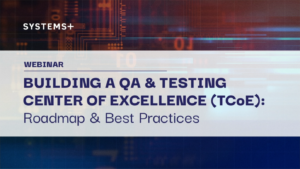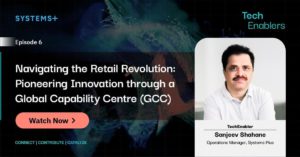Driving Digital Transformation Success with a People First Philosophy


With
Chief Information Officer,
Reeds Jewelers
Enabling Digital not only refers to utilizing Technology to develop new products, new services, and better processes in order to sustain the market but it also means leveling up the People by minimizing their laborious efforts with Digitalization.
The podcast series explores how CIOs can capture opportunities by looking at and beyond technology and data to propel their organizations into the digital forefront.
The podcast series looks at how independent thought leaders and visionaries from the tech industry across the globe bring their ideas to scale within the business world, sharing innovative, path-breaking insights with our listeners.
We interview experts on trends and best practices for IT leaders. Sapan Choksi, CEO of Systems Plus, talks monthly with tech thought leaders on 21st-century business topics like innovation, digital transformation, AI, automation & Tech talent.
We are excited to be in conversation with Arthur Phidd on ‘Driving Digital Transformation Success with a People first strategy’, as part of our Enabling Digital podcast series.
Arthur has over 25 years of global experience at the executive level. He has extensive experience working with organizations to reinvent them through Digital Transformation across industries varying from Retail, Banking, E-commerce, Gaming, and Telecom to even working with the Government as well.
He also has a humane belief to support & educate the less privileged and help them prosper with careers through his foundation.
Sapan Choksi 00:00
Hi, and welcome to enabling digital with systems plus Podcast Series. Today, I have a fantastic guest with me, Arthur Phidd, I'm really looking forward to today's conversation. He is the CIO at Reeds Jewelers based out of Wilmington, North Carolina.
Arthur has over 25 years of experience globally at the executive level. And he has experience leading it and corporate-wide business transformation programs across industries that vary from retail to banking to CPG to E-COM, gaming, Telecom, and he's even got some experience with the government is really, really interesting. Arthur, it's great to have you here. How are you? Thank you. So, Arthur, I'm going to actually jump into I'm gonna start this a little bit differently. One of the core beliefs that I have, and we at Systems Plus also have is to give back, and I noticed, you know, I read a little bit about your foundation, and I want you to talk about that a little bit, because I think it's really, really cool that what you're doing and really interesting, what you're trying to achieve. So how do you conceptualize it? And how did you actually go about you know, funding it and sort of moving forward?
Arthur Phidd 01:14
Thank you, you know, it's a great question. Um, you know, many years ago when I was the CIO, at Cable and Wireless, and I was based in the Caribbean and the Americas region. You know, when you're running technology for the Tele Co, you become involved in the, in the lives of the people of these countries, right. And what struck me was the disparity between those who have access and those who don't, you know, and the fact that, you know, I was the CIO of the infrastructure for the country, that placed me in a position to try to influence how we can, I suppose, bridge this gap. And as, as the years went on, I just had this, this calling to do more and I just felt that it's a little bit unfair for kids that are growing up in underserved neighbourhoods, to not have the ability to realize their dreams educationally, simply because they don't have internet access, they don't have a laptop, right. And then, of course, when they go home from school at 2 or 3pm, they can't do their assignments. Because as we all know, if we have kids, you're most of their assignments going to be done online. Right. And then when you think about the COVID era where it is online, and they don't have access right Sapan, so what do you suppose gonna happen to them, you don't do the assignment three, four or five times you get a bad grade, you get kicked out, and then the spiral continues. So I was moved to do my part. And I started my foundation, to, to try to improve as many lives as we possibly can, through donations, and fellowships and support, and release a ton of my own funds, you know, to sponsor kids to build out community homework labs. So kids can go there and be mentored and have access to the internet. And so that's sort of where the inspiration came from. And it's been pretty fulfilling to be honest.
Sapan Choksi 03:37
I mean, that's really amazing. And actually, you know, it's inspiring to be honest. Thank you for that. So, one thing that sort of I did read about you was about your whole thought process behind what?
Well, today's buzzword, which is digital transformation, right? As a CIO, I'm sure you hear it in 20 different ways. Daily, probably, right. But I know when we were talking a little bit earlier, you mentioned that, that digital transformation means different things for different people. So what does it mean to you? And how do you look at it? And more than that, how do you sort of help the business sort of come along? Because today, more and more, what you notice is IT and business have to be partners, whereas historically it didn't used to be like that. So if you can just help me through your thought process?
Arthur Phidd 04:38
Sure, if this is one of those topics that you could spend weeks on and you know, I teach a course at the graduate level, at the University of the West Indies and it's called IT economics. And another one that's called IT Systems Management and they kind of commingle, I suppose the key points, basically revolves around? What is the role of IT in an organization? And when you look at it historically, you know, it has lived in many, many verticals in a company. I mean, there was a time when IT was the finance department, and that's, you know, pre-World War Two and, and post-World War Two, where the finance guys, yeah, the the finance guys control the money and they needed to do accounting and so they would, you know, get a big mainframe and they were the only ones who could run reports. So naturally, as we moved into the, you know, the post 70s timeframe, where else would you put IT, except CFOs can't drive IT, it's unfair to ask them because what's the CFO gonna say to a guy who just graduated from MIT with a master's in computer science, about his career path? Right, right. So we've seen IT go through those were transformations. It since its inception has been viewed as the guys who keep the lights on. Right? They're an afterthought. And even today, there are chief executive officers who still can't get their brains to understand that if I may say, so the future CEOs are going to be extremely IT literate. In fact, CIOs, and there's literature out there right there, CIOs are being taught to become CEOs. Now more than ever before. So we get into this digital transformation business. And, you know, when the internet came around, sometimes everyone said, Oh, we're digital. So why would you say that? But I have a website, right? So you get that definition of digital transformation, then you get the other side of it, which, you know, oh, we were going to build an app. They will, okay, now we have digital transformation, we got a website, we got an app, I guess that means we're ready. And then there is the digital transformation around this thing called omni channel. Say, Okay, well, what does that mean? And the average person starts the omni channel discourse, from what I call the outside in Sapan, where it's all about the you know, what the customer sees, and the fact that a customer can truly, you know, shop at multiple channels, you know, they can use a marketplace, they can use a brick and mortar, they can use the website and use the app. But that's not, that doesn't mean you have an omni channel framework, it just means you have multiple channels through which the customer can purchase. So for me, the digital transformation is a three part concept. It's a triangle, there's people, there's processes and technologies. Right? Right. And if you don't harmonize these three Sapan, then you don't have a digital transformation, what you have is sort of this disparate sets of persons at varying degrees of adoption with technology. So where do we go from here? In my view, we have to step back and understand the goals of the organization, the competitive landscape, and we have to think carefully about capacity planning and management. And drive innovation, all of those together, right? When you mix them in, puts you on the path to become a digitally transformed organization. So yes, you're gonna invest in technologies for, to drive innovation, to drive process efficiencies, but you're also going to have to invest in people, right? In some cases, new people. In other cases, you're gonna have to seriously want to upskill your staff, and yeah, and it's a cost. But you still have to be committed to doing that. And you're gonna have to be willing to trust as leaders. If you're going to shift the paradigm was people intensive and paper intensive. And now you're going to shift to be a little bit more real time online connected, then it means you're gonna have to trust these persons that you've hired to lead you through the transformation. Right? So digital transformation requires that you understand the capacity of your organization, understand the competitive landscape. Accept that you're going to have to harmonize your infrastructure, your databases, your data models, you're going to have to drive a oneification of your marketing framework, your the way you support customers, and each channel is going to have to be, here I go again onify. So if Sapan walks into the store, he should feel as if he's on the website and vice versa. He should feel that harmonized experience. And so it's all of that. So there isn't a simple one sentence answer is there?
Sapan Choksi 10:29
No, there definitely isn't. So do you feel that retail actually lead the way in that thought process? Mainly because of the amount of touch points that the industry has?
Arthur Phidd 10:43
Ah, gosh, retail, so many things roll into that, right. You know, for example, where would you put Amazon? Are they retail? Or are they are they a platform? Right? So for me, Amazon's a platform, that retail should leverage. But for the purpose of the conversation, you know, if you compare retail to banking, right, a retail is clearly ahead, because of the nature of the products and the competitive landscape. But we do have, I guess, fragmentation and in many retail strategies, where you still have in one companies Sapan essentially multiple little companies pretending to be harmonized, right, you've got companies where the brick and mortar, you know, is kind of off doing their own thing. And, and the E commerce teams over here doing their own thing. Whereas you have at the other end organizations that have decided to leverage things like the ability to see inventory across all stores, whether it's digital, or brick and mortar, so you can do things like buy online pick up in store, for example. Right. So I think it would be fair to say that, across sectors, the retail sector is the one that's trying novel things. And the others are catching up. If you think about banking, in my last role in a banking environment, my phraseology was, let's turn the bank into the into a retailer of financial services, because I believe that if you begin to look at things from the perspective of a retailer, it changes your view, you start thinking about how you compete, how do you drive customer acquisition? Right? And how do you maintain customer retention? But yeah, I would say the retail sector is probably leading in this vein.
Sapan Choksi 12:41
Okay. So then, how do you touched upon people, right, and I find it that is usually the hardest thing to manage that not did not did well, the change minor aspect, because I can have the best technology can have the best processes. But if there's no adoption, then my technology is as good as useless. And if people don't follow the process, then my process is also as good as resource. So how do you manage the people side of it? And especially the change and how to bring people along from a change management perspective? Because that is where we have seen things break down, usually more often than not.
Arthur Phidd 13:26
Look, it's the age-old question, right? How do you make someone do something they really don't want to do? Right? You know, there is no silver bullet, there is no single answer, I can tell you techniques that I've used. And since I lecture on those topics, you know, I've been able to apply many of these concepts. But it's really about starting with executive buy in, right. At the end of the day, if you're trying to transform an organization and the senior most executives and quite frankly, the CEO specifically, hasn't really bought into it. And I mean, not lip service, buy in Sapan really buy into it. Right? If if you can't get that, then it's gonna be uphill all the way. If the cohort of executives aren't bought in, then the person tagged to drive the transformation has to be willing to spend the time to understand what they want, from you know, as far as their responsibilities are their piece of the business, what motivates them, what drives them, what works, what doesn't work, what are your issues. And I think once you start requesting that feedback, and then you start helping people understand timing and understand how they're going to benefit from it. They'll start to come along now they don't have to do cartwheels and wave pom poms and go out Don't tell everybody but the point is they understand that there is some value for them in this change. And, quite frankly, what I do is I allow my internal clients to make a lot of decisions. My role is to be the shepherd. My style of leadership, I classified as servant leadership, okay, my goal is to understand your wants and needs and to essentially, do all I can Sapan to create a Petri dish within which each of my internal clients and their downline team members can become successful. goals. So, the hard part is the time, energy and effort in my case, as a CIO, and I think all CIOs, by the way, you have to put yourself into it. And you have to be willing to understand each of your cohort members understand their strengths, their weaknesses, their likes, their dislikes, their visions, it might not all be aligned, right. And then you have to be that coach, that Shepherd, that servant leader, to bring them along. What is all this means Sapan, it's not going to happen in a week. Right? It takes time.
Sapan Choksi 16:20
So let's touch on that point a little bit in terms of servant leadership. That means there's, it's very difficult, well, certainly leadership, by theoretically definition, you cannot ram it down anybody's throat, you have to bring people along, there has to be collaboration, etc. And hence, yes, often it does mean time. Of course, if people are bought in, there's better outcomes. I agree. But sometimes, business especially today, the way the speed of this business is booming. How do you practice both. And what I mean by that is, ensure that you stay true to your servant leadership style, and yet, ensure that everything is moving at the speed the business needs it to.
Arthur Phidd 17:08
Right. And this is why the role of the CIO has to be redefined. When we started a few minutes ago, you know, CIOs are not hired to keep the lights on, right. We are truly entrepreneurs. We are visionaries. We are innovators. We are equipped with process management. We are pretty damn good at identifying inefficiencies and workflows. We are experts at understanding the needs of an organization and the finances required to support it. In other words, we're running a line of business, right? As a result, the C, therefore, has to have that seat Sapan, that morning meeting with the other executives and his or her update is not which router failed or which firewall failed, right? Right. His updates are along the lines off, hey, we're looking at the data. And we're beginning to understand that there are new opportunities on the West Coast, or new opportunities in another country, based on what we're seeing in industry reviews and things like that, to bring that to the table, as the CIO is really critical in order to have your colleagues build confidence, right? So now, if one was if you're driving the change, right, as is the case, if you have kids, there are times when you say what it's going to be and that's it. Right? If you don't lead with that. Because if you lead with that you build resentment right up front. Right.
Sapan Choksi 18:55
So actually, what I was gonna ask is that, do you feel that the CIOs are trying to get the respect? More so than how it was before? Because, yeah, it's exactly as you said, you know, when the CIO is reporting to the CFO, just by design, and you'd be surprised that there's still organizations, here deal with where this is still. Your I mean, it's the way of the world I suppose. But yes, I agree that the world is changing, but, you know, you having been in industry for so long. And it's so much experience at the at the C suite level. Have you seen the change?
Arthur Phidd 19:32
You know, it's not as expansive as I would like it to be Sapan. Where I see the most is within the realm of startups. Right? Yeah. I suppose if you're building it from the ground up, you know, in the time that we live, I'm not going to make those mistakes, right? Like I fundamentally pose this question. If the role of the CFO fundamentally at its core is really to control cost. And if the role of the CIO, fundamentally at its core is to drive innovation, which requires spending, how can you have the role that must spend reporting to the role that must control cost? An irresistible force? Whether an irresistible force meets an immovable object, what happens? Right? So, for me, there's contention in the org structure, when you do that, unless Sapan, the view is IT is a support function. Then great if you think IT is there to keep the lights on, to wait for someone to open a trouble ticket to you know, run cables, when you're running, building a new store, then then I suppose that can work because all they're there to do is to have a series of tasks and they just check them off. And they, but what I've seen is in the startup realm, CIOs are doing exactly what I've said, in the pre startup era. There's a massive contention, people today, step companies that have been around for 50,60,70 years, right? You know, they still struggle to understand the role of a chief information officer. And oftentimes, if the CIO is not strong, does not demand what they want, then what will happen is they will get relegated to being the person who runs the guys who keep the lights on. It's not at the rate that I'd like to see it in older companies. But certainly, I see it in all the startups where the CIO is truly an entrepreneur.
Sapan Choksi 21:57
So another sort of question that I had are, like checking on is, I mean, especially in the last couple of years, tied adoption has really propelled the whole thought process in terms of, again, I'm going to use this word very broadly digital transformation, right? And it means different things for different people at different stages in their lifecycles. But do you feel that these companies have been on this journey? Well, before the cloud adoption really took over? And of course, you know, in the last couple of years with COVID, etc, when people just sort of had to make this hard vote, are forced to make these choices? So, what are your views? I mean, is it? Is it like, oh, the cloud is not the new Savior, and therefore it is the way to digital transformation. I mean, I have my perspective, you can hear it in my tone, but I want your perspective.
Arthur Phidd 22:51
So, it's, you know, it's weird, because it's the definition of cloud, right? So fundamentally, we've always had this concept of a cloud, which didn't look at it that way, right? You know, your data center is, you know, 800 miles away, that's your cloud. Okay. You own it, but fine, get over that. It's your cloud. I believe that the adoption accelerated, especially as we got into this new century, right? My personal belief is, I'm a strong believer in things as a service, whether it's data center as a service, or software as a service, or security as a service because everything has a service today. Right? Right. But I'm a strong believer in bifurcating core competencies. So, my company, we're terrific at what we do diamonds, luxury jewellery, and that sort of stuff. Right? Why on earth do I want to own my data center, when all I have to do is subscribe to any of the many cloud data centers out there, where they have people who are dedicated, trained and skilled at that specific task. For example, one of the things we have experienced that read is for years, we've been running on a legacy AS 400 platform, which was a good idea at the time, right? Because everything was a good idea at the time. But it's no longer a good idea. But it's not a skill that I want to sort of curate in my future IT organization. So, what do you do? So, first thing we did was we moved it and we went searching, believe it or not, we went searching for a cloud hosted AS 400 as a service. And we actually found one.
Sapan Choksi 24:52
I was just gonna ask you that, okay,
Arthur Phidd 24:55
I guess all of my ex IBMers am ex IBMers too. I guess is the whole bunch of BMers, who you wondered where they went? They probably ended up at this place. And so, we're running AS 400 as a service, believe it or not, right? And, similarly, our E-commerce reeds.com is not sitting in a data center at our head office, why would I do that? It's sitting with a bunch of guys, we're experts at it. I think, yes, the adoption has gone through that J curve. Right, where more and more companies, certainly in the United States, and especially in Europe, and even in China. See that as a default? Now there's still regions on the planet where there are CEOs and CIOs Sapan whom I swear they want to go hug the machine and cuddle it and say, oh, nice server, I own you. I don't get it.
Sapan Choksi 25:59
So interesting, you say that, given the industry you serve, because the diamond jewelry industry is notorious for protecting, thinking that if I do not have, if I cannot hug my server, somehow, all my customers, which is gonna leak out, and some competitors gonna come in and take it all the way. So, and clearly you have been in the forefront of that. So how did you actually convince sort of your leadership, team management, etc? To say, hey, you know, what? Don't worry, it's not like that. That's not how it works.
Arthur Phidd 26:34
Yeah, I mean, so it's the art of writing a business case. And, you know, honestly, in at least two or three of the courses that I teach, you have to write a proper business case, to get that a right. So, the two ways to create that case, as a CIO, you could do it based on organizational improvement, or you could do it based on risk avoidance. The risk avoidance is the one I use the most. See because for us, you know, where we're located, and where we had our data center, which is a computer room is in a geography that's notorious for hurricanes passing through, right. And so, we made the case that this is truly a business continuity risk, right. And you also have need to get a good lawyer, software lawyer, and we happen to have those to ensure that all the right paragraphs and languages around indemnification and risk ownership are in place. But it's really about writing the business case and explaining to your team members, your peers, your chief executive, your board. why it makes sense. And to present it as an avoidance of for potential catastrophic risk, which nobody wants to have to deal with. I've not met a board member who would say, Yeah, I'll take the risk of a hurricane wiping out my data center. Right.
Sapan Choksi 28:12
Well, you're right. And you're absolutely right. So I want to switch gears a little bit to innovation in retail, especially in jewelry industry, and you coined a term called Jewel Tech. Tell me a bit more about that. I mean, I've, you know, I've seen the product, the stuff that you sort of sent earlier, it's really cool the way sort of be designed, etc. But you know, I don't want to, you know, you can explain it a lot better than I can.
Arthur Phidd 28:40
It's, you know, I coined that. I don't know if someone did it before, but I just decided I was gonna use it based on experiences I had in being a part of the transformational team at a bank prior to joining Reeds. And that is where the whole notion of FinTech emerged these technology companies that are developing novel and efficient financial services components. And so with the FinTech partnering with the bank, you're able to do things you know, your customer acquisition, customer retention, you speed up time to deliver products and services, right, you drive efficiency, you reduce costs. And I thought, well, we could do the same thing in this industry, this industry is ripe for it, by the way. And so as I searched, you know, especially if you look in Israel and India, certainly, you find these startups or mature companies that are building foundational technologies that you can use to exploit or you can exploit them to enhance the way you deliver a product to your customers the way you create an immersive experience when you're online that allows the customer, especially in the middle of a pandemic, to do the things they would do, if they walked in a store, like, try on a product, you should be able to try it on, right? Like having a rich, three-dimensional experience, the way you would if you literally picked up a watch or a ring. And in my mind, if we were able to use holograms to bring that to pack, then I would assume that we could use holograms to show off our products and services. So at Reed’s, I have created an innovation lab. And when I tell colleagues in the IT space, that we're a jewelry company, and we're even using these words innovation lab, they sort of look at me as if Well, dude, where are you from? Like, its jewelry. But no, we are driving innovation. And I've established a lab where we're trying, we've literally created a store in the lab. So we have a number of our future Store of the Future Services, I can't go into them that we're going to bring to market but it's the proving ground, right? So I've told you about the spatial reality display device, and our ability to create rich, 3d immersive experiences, and many others. And so we try them out in our lab, and then we kind of decide, okay, well, here's a store that we're going to put this in, because the store is, from a form factor ideal for this type of technology or market segment based. So we're very innovation-driven. I just can't tell you all of the things.
Sapan Choksi 31:56
I'm following you guys; I'll see it for sure. We're nearly out of time. But I want to, I do want to ask you one last question. It's a very open-ended question. But I'm going to ask it anyways, so what drives you? Because you, I mean, you know, every single thing I've read about you, and even the interactions that we've had, even though you know, not enough, acquainted, love to get to know you a lot better, but you are, you come across as extremely content, person, and some of you and people gravitate towards you. So, I would like to know your secret what drives you.
Arthur Phidd 32:31
You know, I think I'm lucky in many ways. I heard someone say, once that the two most important days of your life are the day you were born. And then the day you know why. Okay, and I feel I've been blessed, fortunate and lucky to have figured out the latter. I am very satisfied with what I do and why I do it. My love is teaching and, you know, shepherding. And that's, not tied to, you know, what I learned in business school or any of my academics or anything like that. It's just who I am as a person. I believe that we are all here to help each other. And that means when you're at work, and you take on this awesome responsibility of the title of leader, you need to recognize there's a difference between management and leadership. Right? Dr. Kotter said it, management deals with the status quo. Leadership deals with change. Therefore, in this century, we must create more leaders. I view that as my goal that my direct reports will tell you every day they feel like they're in a lecture hall with the professor side of me, driving them by some of my colleagues on the business side and various companies that I've worked in will say the same thing. So what motivates me is seeing You Be All You can be is knowing that I contributed to creating an environment that allowed you to kind of fulfill your dreams, whether it's academically or career-wise, and I get a big, huge kick out of doing that. And then I'm doing the job that I liked doing. Like I just like, doing this stuff and I think I've just been, I've been blessed, fortunate and lucky at all at the same time.
Sapan Choksi 34:59
That's absolutely amazing. I definitely don't want to stand in the way of you and your vacation. So Arthur, thank you so much. Really appreciate the time. This has been fantastic and amazing for me. And I'm sure it'll be very amazing for all the people that are listening. So thank you once again. And I really, really look forward to meeting you very soon.
Arthur Phidd 35:24
Thank you. Stay in touch. Oh, absolutely. Take care.
Sapan Choksi 35:29
I wish you and your family a very happy and healthy holiday season ahead.
Arthur Phidd 35:31
Thank you. Bye now.
Sapan Choksi 35:34
Bye bye. Take care. Okay.

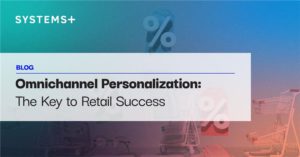
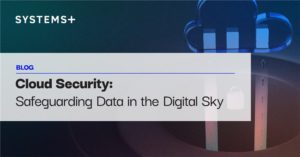
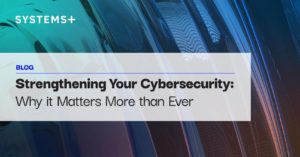
Amazon Web Services
Know MoreAmazon Web Services
Know MoreAmazon Web Services
Know More